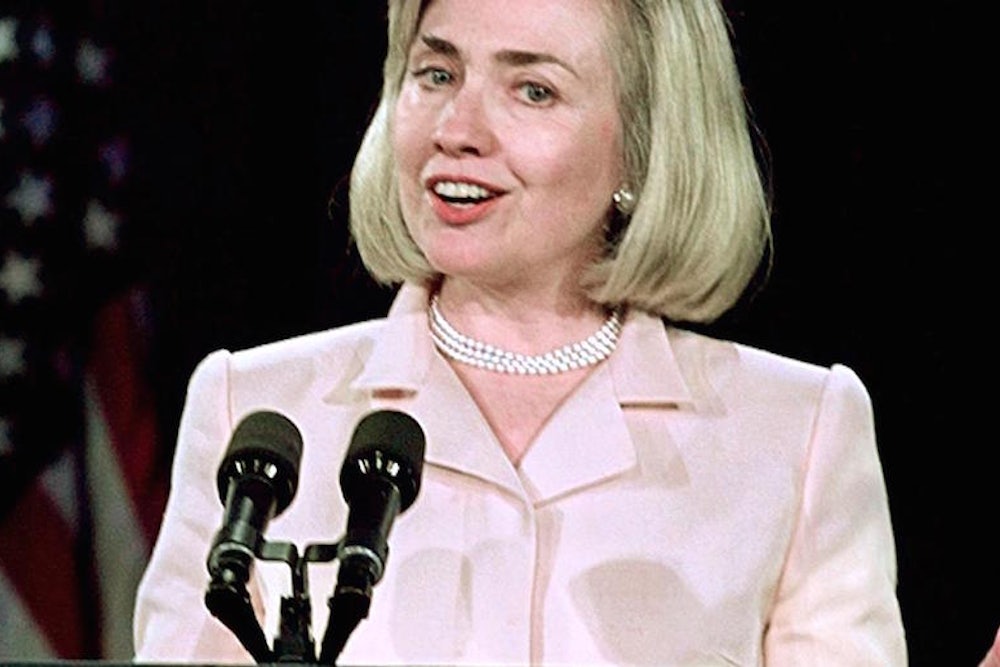That the email controversy surrounding Hillary Clinton is still raging after nearly two weeks has awakened in Democrats a familiar dread. Nobody expected Republicans to give Clinton an easy time, but some of her supporters clearly hoped that time and experience had changed the way the press would adjudicate scandal accusations, or at least had diluted old suspicions so that the Clintons, their political enemies, and the media wouldn’t combine to form such a toxic brew.
As TPM’s Josh Marshall wrote, “the email story is shaping up to be another classic Clinton scandal. On the merits, the hyperventilation seems way out ahead of the actual facts.... And yet here we are again—with an almost infinite, process-driven scandal that can easily continue on into a Clinton presidency, if there is one.... Always a dance, always drama.”
The ingredients of this particular drama lend themselves to unending innuendo and recrimination. Clinton and her lawyers controlled all of her State Department–era emails, decided amongst themselves which to hand over to the government, and will presumably resist all GOP efforts to peek into the remainder, assuming they’re still retrievable. Republicans can thus whip the paranoid/birther contingent of their coalition into a state of permanent suspicion by projecting whatever malfeasance they want on to the missing emails.
But I think the nature of the email story makes it a poor proxy for gauging the relationship Clinton’s campaign will have with the press going forward. Keep in mind that this isn’t the first Clinton error Republicans have tried to exploit. When the press has taken GOP Benghazi accusations seriously, it’s gotten burned. Republicans have more credibly tried to raise questions about Clinton’s big dollar speeches and Clinton Foundation fundraising practices, but none of these stories have captured the press’ interest quite like the email controversy.
What distinguishes the email controversy is that it intersects in obvious ways with the professional interests of the same political press corps that will cover Clinton throughout the presidential campaign. It’s such big news because the news itself has a clear stake in the issue. The national press corps doesn’t generally expend a tremendous amount of energy holding senior bureaucrats to the letter of records-keeping protocols, or worrying about how much public business government officials are conducting on private email accounts—though perhaps they should.
But when reporters learned that the most public and politically aspirant of these officials had it in her power to deprive them of records to which they should be entitled, those reporters, quite predictably, responded not just as reporters but as representatives of their trade. This isn’t just any old process story, but one which practically invites reporters to miscalibrate in expressing industry outrage.
It’s also an old phenomenon, and one Clinton really should have anticipated. She hadn’t left Foggy Bottom for more than five months when the same press corps erupted over the revelation that, while conducting a leak investigation at the State Department, the DOJ had used a secret warrant to seize Fox News reporter James Rosen’s emails.
The press was correct to criticize that particular tactic, but in so doing it revealed a kind of shallowness about itself. It didn’t object to DOJ intimidation per se, but to the fact that a reporter rather than a mere civilian had been the target. If Rosen had been an imam in Michigan or a political dissident, the White House briefing room would have been mostly silent about it.
Instead they made it front page news, and forced the administration to examine itself to such great effect that Attorney General Eric Holder now considers the DOJ’s conduct toward Rosen his greatest regret. My hunch is that Hillary Clinton will have to put herself through a similar reckoning before the press lets go of the email story.
Assuming she does, though, I don’t think we can say with any certainty that it will set a tone for the media’s overall coverage of Clinton’s campaign. And as a political issue of its own, the email controversy will probably prove to be self-limiting. Republican presidential hopefuls like Jeb Bush and Scott Walker have email problems of their own—which, unsurprisingly, are a much bigger deal to in-state reporters in Florida and Wisconsin than to the national press corps that has been covering Clinton. Moreover, if Republicans in Congress allow their questions about Clinton’s emails to morph into a witch hunt, they’ll turn her into a martyr.
This particular Clinton drama is sui generis. Which means we’ll have to wait until the next imbroglio to learn whether the media and the Clintons will get along better this time around than they did in the 1990s.
